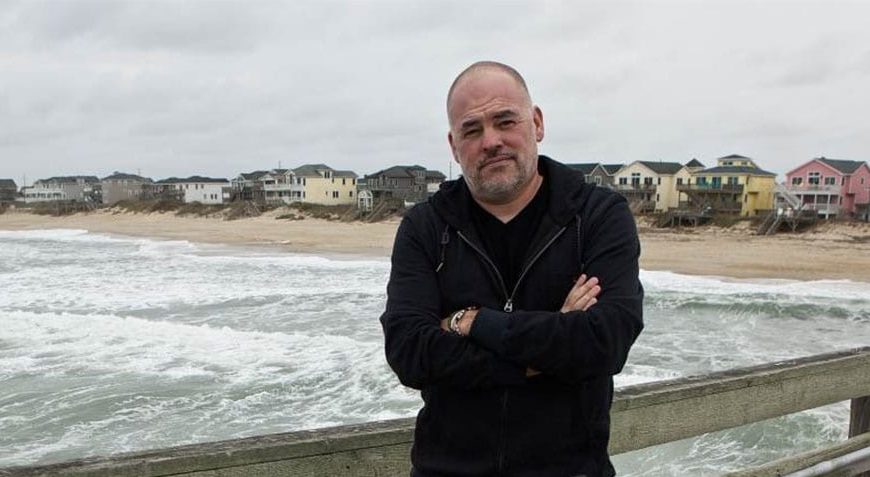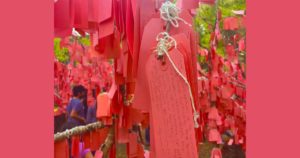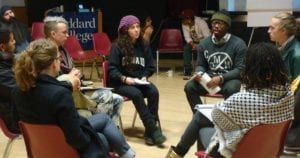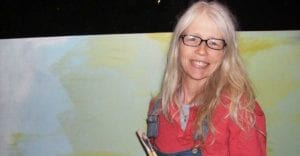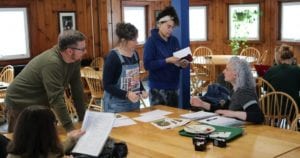 It’s the last day: December 31, 2016. The year of shit and magic has, in other words, almost come to an end. I’ve allowed myself a day or two of returning to bed, to cultivate my inner world. Well, to drink tea and read books on things like “radical beauty” by Deepak Chopra, an unlikely but optimistic beauty consultant, which leads to going upstairs, eventually, and massaging one’s entire body with heated sesame oil then precariously taking a shower. We had a house-guest from Senegal this Fall, Abulaye, a newly-arrived immigrant to these blatant shores, and he took one look at our shower, removed the no-slip mat AND the shower curtain, then stepped in. I had just done my Ayurvedic routine (see: above), and so this did not go well. He slipped, horribly, and didn’t tell us he had banged his head until we were up in Rocky Mountain National Park photographing the slightly bored yet ubiquitous elk and he needed to sit down, abruptly, on an outcropping. We immediately decamped to drink hot chocolate in a local café, where he told us a vivid story of a goat sacrifice next to the pink lake of his childhood. Self-help, in other words, has its limits.
It’s the last day: December 31, 2016. The year of shit and magic has, in other words, almost come to an end. I’ve allowed myself a day or two of returning to bed, to cultivate my inner world. Well, to drink tea and read books on things like “radical beauty” by Deepak Chopra, an unlikely but optimistic beauty consultant, which leads to going upstairs, eventually, and massaging one’s entire body with heated sesame oil then precariously taking a shower. We had a house-guest from Senegal this Fall, Abulaye, a newly-arrived immigrant to these blatant shores, and he took one look at our shower, removed the no-slip mat AND the shower curtain, then stepped in. I had just done my Ayurvedic routine (see: above), and so this did not go well. He slipped, horribly, and didn’t tell us he had banged his head until we were up in Rocky Mountain National Park photographing the slightly bored yet ubiquitous elk and he needed to sit down, abruptly, on an outcropping. We immediately decamped to drink hot chocolate in a local café, where he told us a vivid story of a goat sacrifice next to the pink lake of his childhood. Self-help, in other words, has its limits.
I am an immigrant, too, living a strange old bucket of a life out here in Colorado, where the sun has just risen, turning the bits of tree on the other side of the parking lot a burnt buttery-orange. I came to my writing studio on the other side of Loveland to write, getting as far as copying out a tweet onto a bit of paper and pinning it above my desk. It’s a quote from the book Penury, by Myung Mi Kim, a poet with whom I once ate a quiet, nourishing meal in Buffalo. I remember the delicious spring rolls that were boiling hot on the outside and alive with garden products that felt like they’d just been tugged out of the earth once you bit in. The quote:
“perimeter onset”
“That which is forced outside flesh.”
I guess they are two separate fragments, now that I look at them on this page. Even longer ago than the time of the spectacular appetizer platter of western New York, I remember standing in a carpeted corridor at an AWP conference, after a panel called “Mongrels and Mutants,” that both Myung and I were on (all of which makes it sound as if we are old friends, when we really have only met three times, one of which involved Myung gazing at me steadily, in Boulder, after a poetry reading, then asking: “Do you drink?” Then, without preamble, she ordered me my first real martini, which tasted like unscented deodorant that had been left in the fridge. I secretly poured it into my friend Melissa’s empty water glass when she was in the loo.) “Myung,” I said, “I loved your talk.” On a napkin during the communal coffee that followed our panel on hybrid writing, I wrote: “How will the fragments attract?” That question carried me right through and then out of my next book.
What is the question you want to ask before writing? Not because of it, or for it. But before. Can you keep asking it, even if the writing never comes?
That’s separate.
I wanted to write, really, on this last day, about what it has been to emigrate to this country, to become a writer of some kind in the country – a recollection of the dazzled feeling of wanting to write: to “come to writing as to life itself,” as per Cixous, so long ago. Is that a proper sentence? What became, in turn, of that intense drive, that fixed desire? I remember staying awake on that first transatlantic flight – before I hitch-hiked to Boise, before I sky-dived in Longmont, before I married my first husband under an apple tree in Brockport or my second in a snow-packed field beneath Devil’s Thumb, before I wrote Incubation on the floor of my living room while Thelonious was at his three-hour Montessori kindergarten on Monday, Wednesday, and Friday mornings, before I was a professor or a massage therapist or a sales associate for The Map, before everything fell apart in ways I could not have dreamed or imagined – writing a story about a girl I had never met, a friend of a friend who lived in Paris. Once, when a couple seated next to her at an Italian restaurant kept glancing over with haughty looks, giving her the up and down – messy hair, jeans – she, this mythological Parisian friend-of-a friend, scraped her plate of spaghetti onto her lap, without skipping a beat, and proceeded to eat it, twirling the pasta on her fork then raising it to her mouth. The conversation did not falter and my friend, who told me this story, recalled the horror of the couple of the next table, spluttering over their flan. I wrote the story of this girl, Harrede, on the aeroplane from Heathrow to JKF, non-stop, full of another French word: élan. I thought this nocturnal sky writing was a sign that I was destined to become a short story writer and live in a studio apartment in Manhattan, where I would, methodically, consume cappuccinos.
This is a blog post for Goddard College, an MFA in creative writing, and not the place, perhaps, to say that I am, this year, double-guessing my emigrant pleasure (the pleasure I felt writing that first story, or even that last London summer, packing my suitcase two hours before my flight with the casual flair of a surgeon who has successfully disguised his drinking problem, his hands suddenly steady as the central cavity of the patient on the table is opened to view.)
A new feeling – a different feeling – about what it has been to emigrate – to come to this country – to become a writer here: came over me: at the start of 2016. I made a connection, in my soul and on my blog, between the aggressions in communities of various kinds – an observed and experienced racism – and a word I hadn’t tasted for some time: xenophobia. Then came Brexit: an anti-immigrant: sensibility or push: in the country I am still a citizen of. What it would be, then, to return? (Something I have been considering as my mother grows older and I face the almost complete lack of resources for the care of non-citizen elders in the U.S. – cutbacks instituted by Clinton, in fact.) I noted an epithet familiar to me from the 1970s and 1980s U.K. of my childhood and adolescence: “Go back home.” Pressing click, we woke one day to the news that the KKK was planning a post-election victory parade. Our hearts turned over like the cow stomachs in our chests. Meanwhile, my students in Boulder came back from Standing Rock with bright, loaded activist eyes. Following or tracking the news of the indigenous resistance, I thought, for the first time, with a lurch of my stomach: this is not my country. When I emigrated, in the 1990s, I never understood my hopeful gesture, my art/life/beauty gesture, as a settler act. Rachel Zolf, the poet, another poet, was onto this some years ago when she asked me to blurb her book, Janey’s Arcadia, because, she said: “You are, after all, a settler.” I didn’t blurb the book. I didn’t understand what she was talking about. I felt a bit cross. Update: I met her for the first time this Fall at Kelly Writer’s House in Philadephia. She seemed very kind. After my reading, I collapsed a bit onto a reddish couch at the back of the room with the few writers of color in that space. Rachel Zolf brought me some water. I had an early morning flight back to Denver; I couldn’t talk. Poets are like family. You will always see them again, if you keep writing poetry and they do too. Belatedly, I understand what Rachel Zolf was trying to say to me, all those years (three? four?) ago.
“What is the role of a diasporic writer in a world with recalcitrant borders, in the time of camps?” – note written on a napkin during a conversation with Andrea Spain about a class we were planning, on “populations.” We canceled the class after an ethical and social disagreement with the person organizing the festival culture we were participating in.
That’s separate.
I’m writing into a word document on the last day of 2016, and the sky is blue, the early light having dissipated. This blog post is turning into a note about the immigrant heart. Let me try to pull myself together. Some questions for poetry, then, or for any genre that devours opposites then vomits cream:
At every stage of your writing, how will you account for your relationship to capital, to the labor of others, to the structures that dispel or sustain you? What is your relationship to the national boundary, to who is allowed to come through it, to pass then enter then stay? And if you’re inside this boundary, what it will take to live? Where in your writing are the bodies of those who have a different experience of this boundary?
I should stop writing now.
I wish you a very good year. Dear writer, dear reader, I hope that you find whatever it is that restores or repairs you in the great silence of your own life, whether at midnight, at dawn, or 3 p.m. I hope that, together, and separately, in our own particular worlds, whether they are volatile or peaceful, that we can keep taking the deepest care of the ones who are not us with the parts of ourselves that are, so often, in turn, unavailable for reciprocal care or touch. I am generalizing, because here it is. A little drop of love. At the last possible moment. In the very last sentence. Of the very last day.
And suddenly I get it.
I didn’t come here to write.
I came here to love.
Dear writer, dear reader, I don’t know what this means for writing, exactly. I don’t know what this means for language or writing novels or the MFA or editing a manuscript after it’s languished in a drawer for the last three years or for becoming the next Elfriede Jelinek or whoever it is you want to be. Salman Rushdie? Junot Diaz? They are, perhaps, already themselves and don’t need any help in that regard. In fact, I don’t know how to close this note, intended to be a meditation on arrival and the dream of becoming a writer in another time. We’ve ended in a place very far from where we began. In fact, perhaps it’s 2017 now. (Update: yes it is. It is January 1st, 2017: 1.28 p.m.) I wrote all day, setting down my computer to run out and buy champagne, or drive my son to Kohls to buy socks. The sun descended to the waists of the houses around us. A blue shadow, and our Christmas tree* began to glow.
*Yes, we have one, despite our Hindu-Buddhist pagan status.
And so, because it’s time to stop writing now, because it was night and now it is tomorrow, I’ll close with a prayer for the last day, which – magically – has become the first day of the year:
May we find a way to be with others, this year, whether they resemble us or not.
That’s it.
With much love to your own resident or non-resident hearts, I shall sign off now and get back to drinking a borderline rancid bit of organic hot chocolate that I found in a cupboard at my writing studio. It is delicious.
All my very best to you, dear writers, dear readers, dear anyone who came here for one reason and has found themselves in the next part of life, where the golden and silver fish swarm towards the hole in the warming ice.

